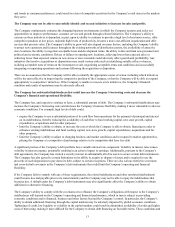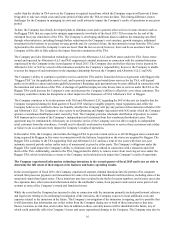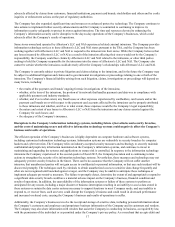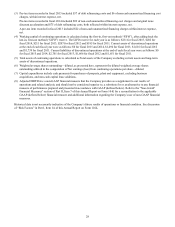Albertsons 2015 Annual Report Download - page 25
Download and view the complete annual report
Please find page 25 of the 2015 Albertsons annual report below. You can navigate through the pages in the report by either clicking on the pages listed below, or by using the keyword search tool below to find specific information within the annual report.23
remanded to the District Court for further proceedings to be determined by the District Court. On January 16, 2015, the
Company filed a Petition for Certiorari to the United States Supreme Court seeking to appeal certain aspects of the 8th Circuit
decision.
In May 2012, Kiefer, a former Assistant Store Manager at Save-A-Lot, filed a class action against Save-A-Lot seeking to
represent current and former Assistant Store Managers alleging violations of the Fair Labor Standards Act related to the
fluctuating work week method of pay (“FWW”) in the United States District Court in the District of Connecticut. FWW is a
method of compensation whereby employees are paid a fixed salary for all hours worked during a week plus additional
compensation at one-half the regular rate for overtime hours. Kiefer claimed that the FWW practice is unlawful or, if lawful,
that Save-A-Lot improperly applied the FWW method of pay, including in situations involving paid time off, holiday pay and
bonus payments. In March 2013, the United States District Court granted conditional certification in favor of Kiefer on the
issue of whether Save-A-Lot properly applied the FWW. In May 2013, the United States District Court denied Save-A-Lot’s
motion for summary judgment on the same issue. This FWW practice is permissible under the Fair Labor Standards Act and
other state laws, and Save-A-Lot denied all allegations in the case. The same plaintiffs’ attorneys representing Kiefer filed two
additional FWW actions against Save-A-Lot and SUPERVALU. Shortly before filing of the Kiefer lawsuit, in one of these
cases filed by a former Assistant Store Manager (Roach) in March 2011, the Superior Court for the Judicial District of Hartford
at Hartford granted summary judgment in favor of Save-A-Lot determining FWW was a legal practice in Connecticut. In
March 2013, another Save-A-Lot Assistant Store Manager (Pagano) filed an FWW class claim against SUPERVALU under
Pennsylvania state law in the Philadelphia County Court of Common Pleas relating to overtime payment. In all three cases,
which the Company was defending vigorously, plaintiffs were seeking monetary damages and attorneys’ fees. On August 20,
2013, the parties agreed in principle to resolve the matters on a nationwide basis in a settlement that will cap the Company’s
aggregate obligation, including with respect to settlement funds, plaintiffs’ attorneys fees and costs and settlement
administration costs. The court granted preliminary approval of the settlement on March 13, 2014 and final approval on
July 30, 2014. Payments to class members began in mid-November 2014 and were completed in February 2015. The Company
recorded a litigation settlement charge of $5 before tax ($3 after tax) in the second quarter of fiscal 2014 in connection with the
expected settlement of this matter. The Company funded $5 into a qualified settlement fund on February 28, 2014.
In August and November 2014, four class action complaints were filed against the Company relating to the criminal intrusions
into its computer network announced by the Company in fiscal 2015 (the "Criminal Intrusion"). On September 18, 2014, the
Company filed a motion before the Judicial Panel on Multidistrict Litigation seeking an order transferring, coordinating and
consolidating the cases to the United States District Court for the District of Idaho. On December 16, 2014, the Judicial Panel
on Multidistrict Litigation ordered the cases consolidated as In Re: Supervalu Inc. Customer Data Security Breach Litigation
and transferred the cases to the District Court in Minnesota. The Company expects a consolidated complaint will be filed within
the next several months.
In December 2014, the United States Department of Labor (the “DOL”), in connection with an audit of the SUPERVALU
Group Health Plan, the SUPERVALU Retiree Benefit Plan, and the SUPERVALU Group Benefit Plan, under the Employee
Retirement Income Security Act (“ERISA”), alleged three violations of its regulations relating to loan transactions between the
active and retiree plans, the Company’s treatment of three rebates it had received from insurance carriers and a description of
the Newborns’ and Mothers’ Health Protection Act by the Company’s third party administrator in its written materials. In
connection with closing out the audit, the Company determined it would make additional contributions and pay interest totaling
$19 to the trusts that fund the three aforementioned plans, resulting in a benefit plan charge of $5 before tax in fiscal 2015. No
penalties were assessed by the DOL. The payments were made on March 5, 2015.
Predicting the outcomes of claims and litigation and estimating related costs and exposures involves substantial uncertainties
that could cause actual outcomes, costs and exposures to vary materially from current expectations. The Company regularly
monitors its exposure to the loss contingencies associated with these matters and may from time to time change its predictions
with respect to outcomes and its estimates with respect to related costs and exposures.
With respect to the IOS, C&S and Criminal Intrusion matters discussed above, the Company believes the chance of a material
loss is remote. It is possible, although management believes it is remote, that material differences in actual outcomes, costs and
exposures relative to current predictions and estimates, or material changes in such predictions or estimates, could have a
material adverse effect on the Company’s financial condition, results of operations or cash flows.
ITEM 4. MINE SAFETY DISCLOSURES
Not applicable.
























